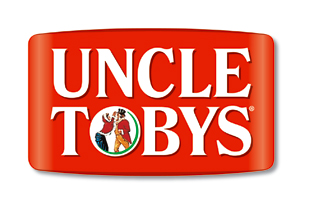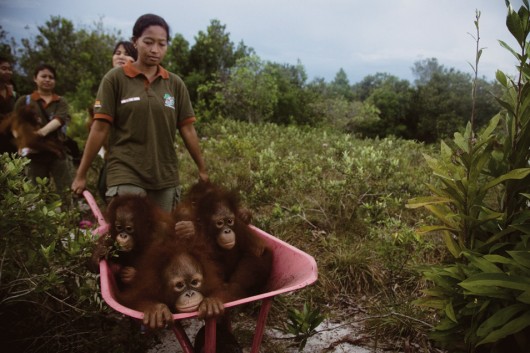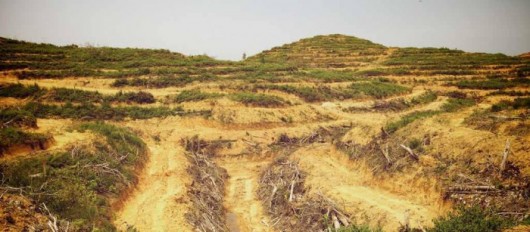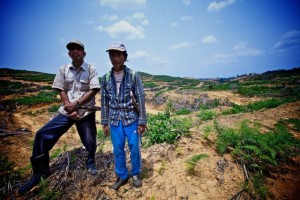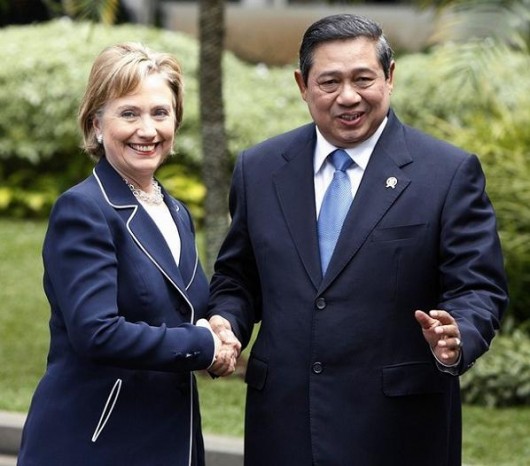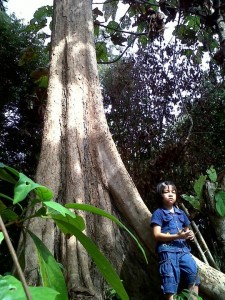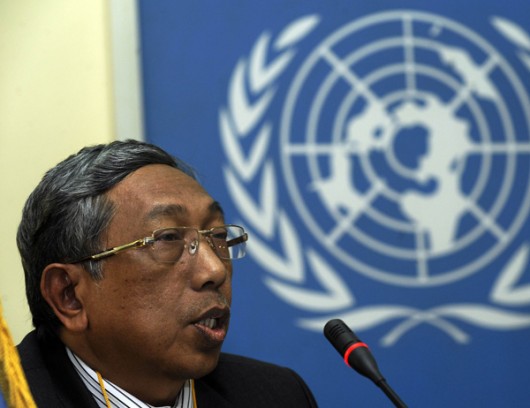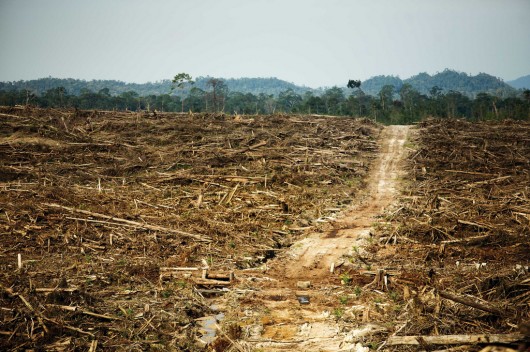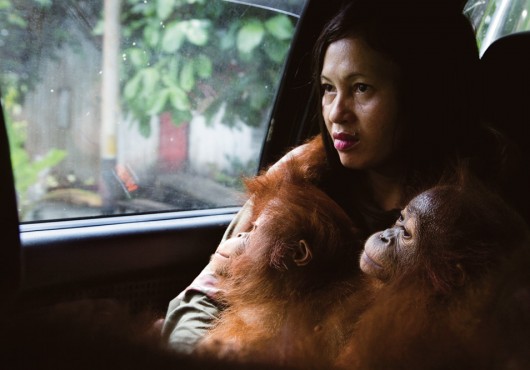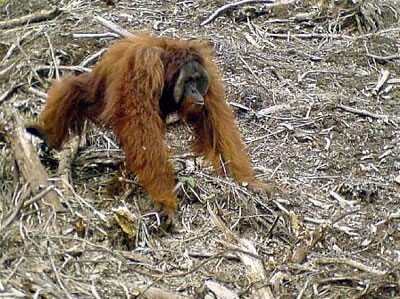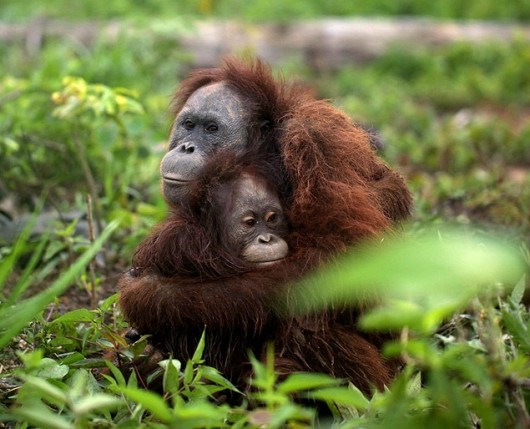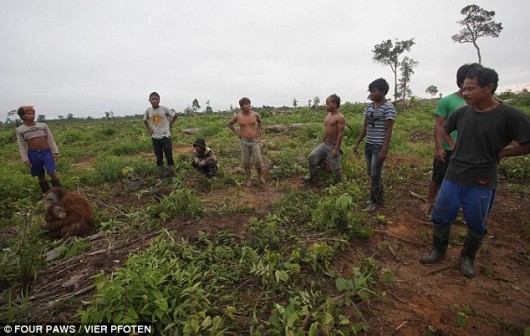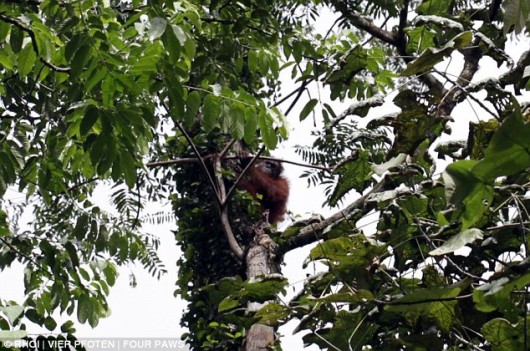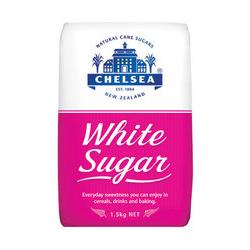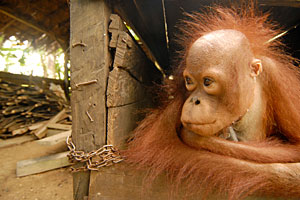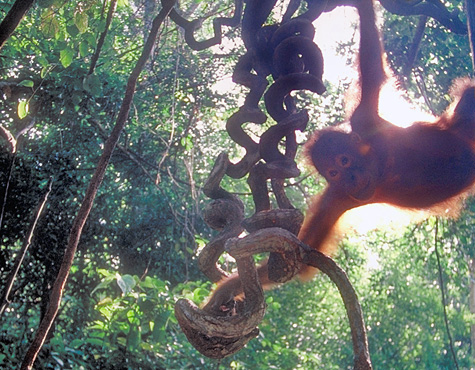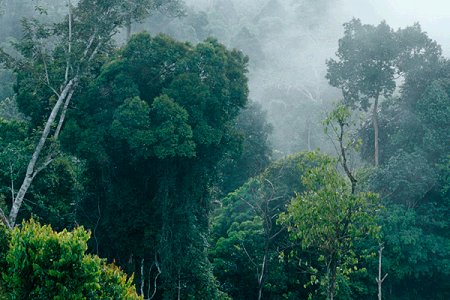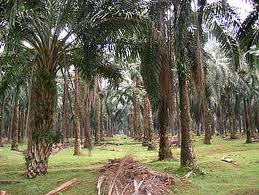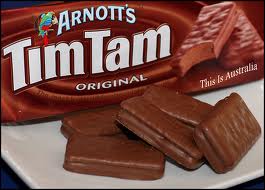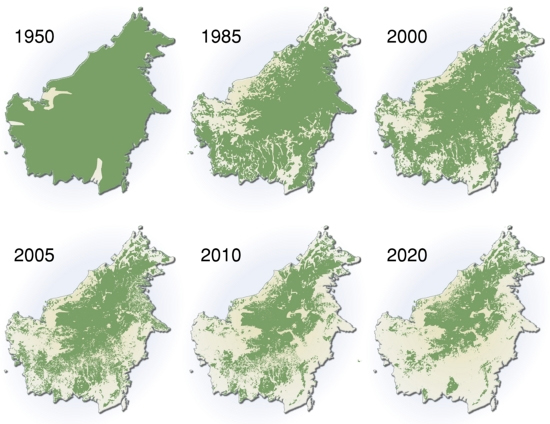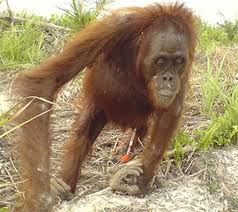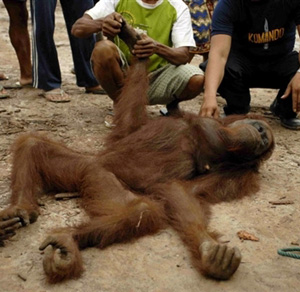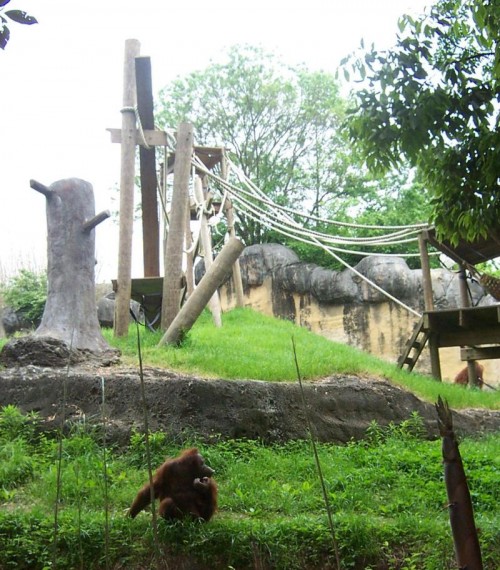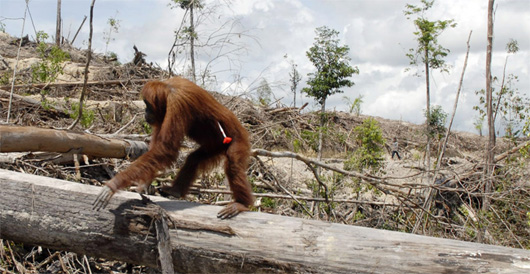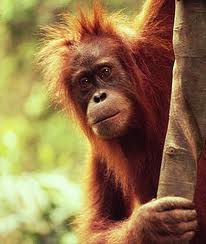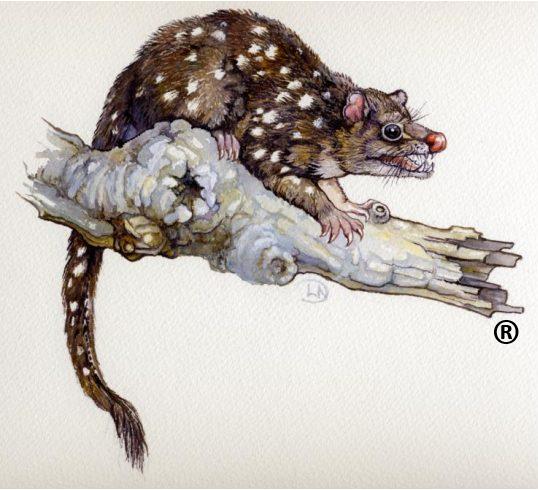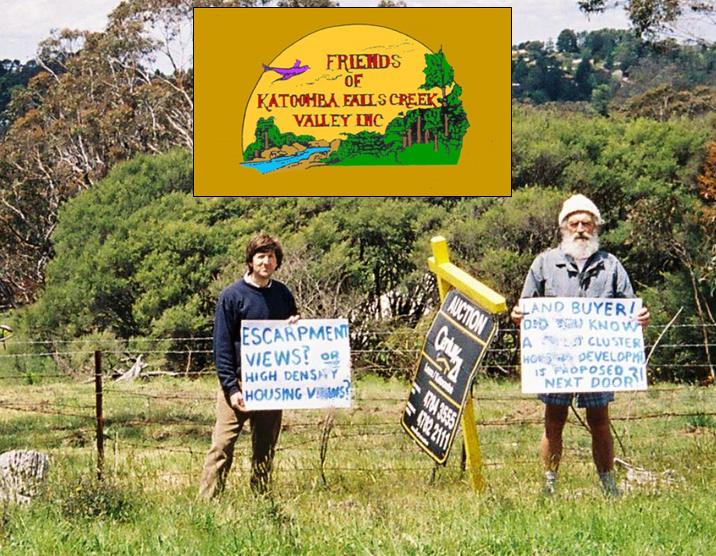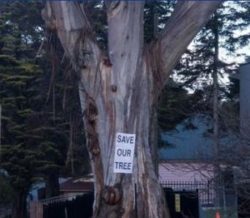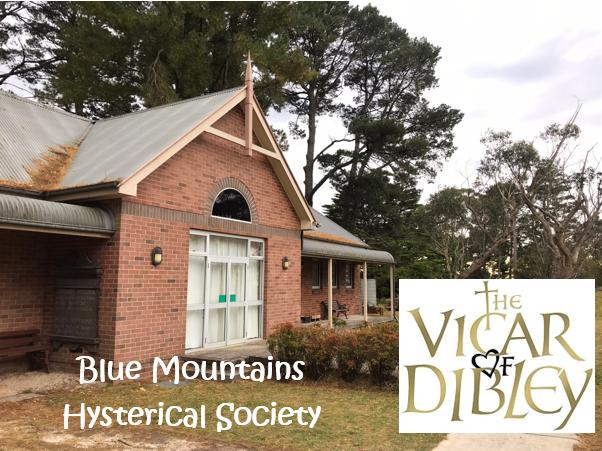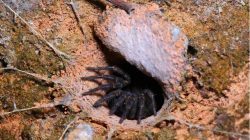Indonesian Palm Oil wiping out Orangutans
Saturday, April 13th, 2013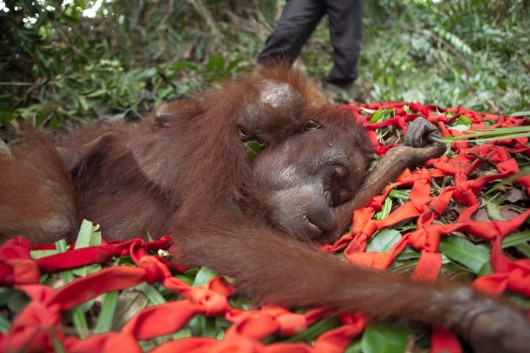 March 2013: she’s almost dead, like her entire species cornered in the wild
March 2013: she’s almost dead, like her entire species cornered in the wild.
<<Footage released 4th April 2013 shows starving orangutans being rescued from an oil palm concession in Borneo after their forest homes were bulldozed by a member of the Roundtable on Sustainable Palm Oil (RSPO), in flagrant violation of the body’s rules.
Conservationists have urged oil palm firm Bumitama Gunajaya Agro (BGA) to cease further clearing immediately amid credible concerns that more of the endangered species are trapped inside the concession and will die if not relocated.
.
[Bumitama is an Indonesian Oil Palm plantation company that cultivates Oil Palm trees and produces crude palm oil (CPO). It was established in 1996 by the Harita Group through its first acquisition of land bank in Central Kalimantan. In 2007, IOI Corporation bought a 33% stake in PT Bumitama Gunajaya Agro.
As of March 2012, Bumitama controls over 190,000 hectares of land bank and has planted 133,000 hectares of Oil Palm trees, mostly in Central and West Kalimantan. Bumitama owns 6 CPO mills (5 in Kalimantan and 1 in Riao), which produces more than 450,000 tons of CPO a year. The main buyers of their CPO include Wilmar, Sinar Mas, and Musim Mas. ]
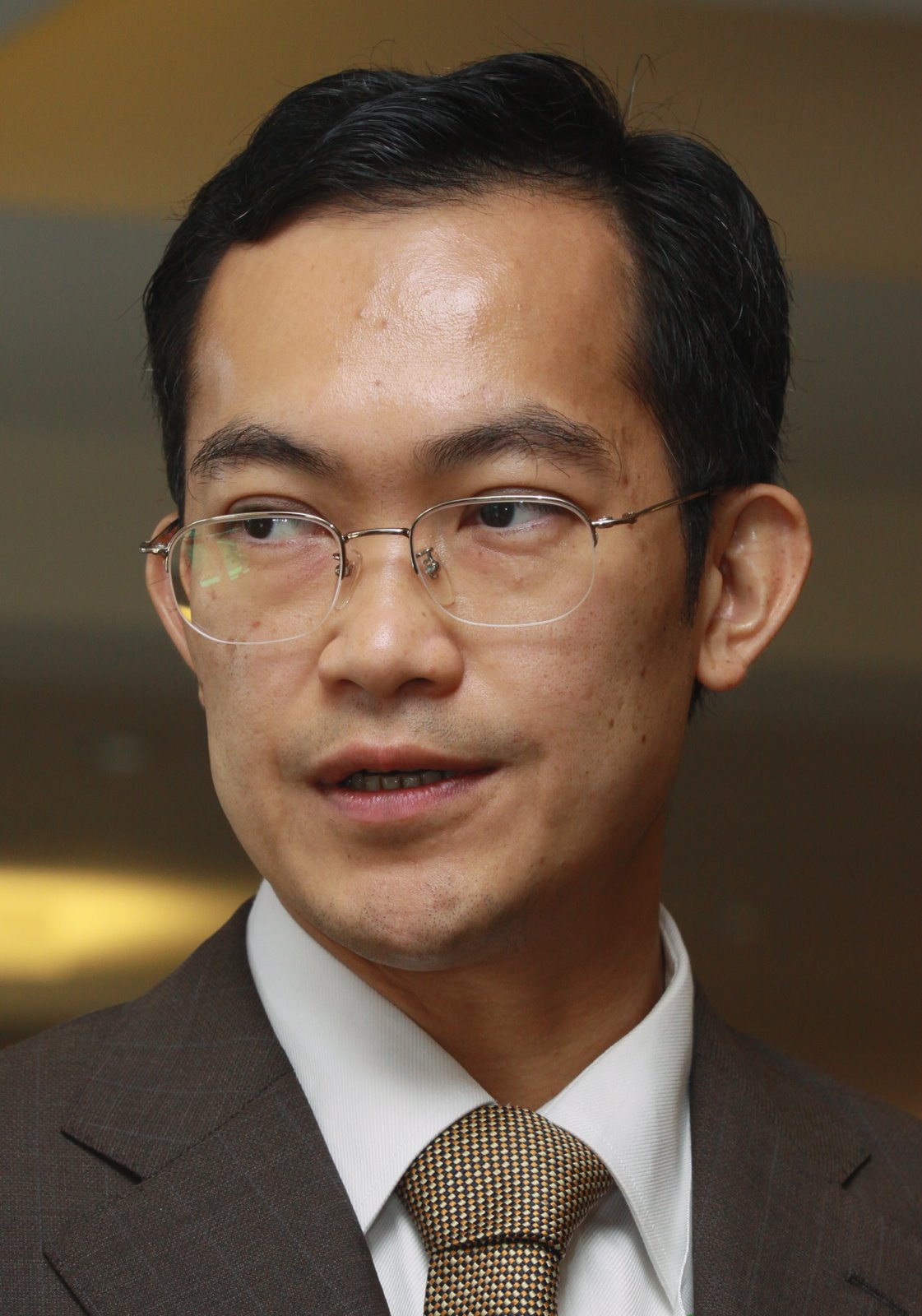 Dato’ Lee Yeow Chor
Group Executive Director,
Dato’ Lee Yeow Chor
Group Executive Director,IOI Group of Companies
.
According to RSPO statutes BGA should have carried out High Conservation Value assessments prior to clearing in the concession, setting aside areas that are home to the endangered species.
However, International Animal Rescue Indonesia (IAR Indonesia) and government conservation staff have already rescued four orangutans, including a pregnant adult and a baby, from the concession in Ketapang Regency, West Kalimantan. Other individuals remain at risk if BGA continues to ignore RSPO rules.
Adi Irawan, Program Director of IAR Indonesia Foundation in Ketapang, said:
“We know that there are more orangutans isolated in small patches of forest in this plantation along with other protected wildlife such as proboscis monkeys. All the animals in this plantation are under threat and therefore this company should stop all land clearing immediately, carry out habitat assessments and develop strategies to protect all the endangered wildlife in their estate”.
The concession is operated by BGA subsidiary PT Ladang Sawit Mas (LSM) in a forest buffer next to Gunung Palung National Park, an area that hosts one of the largest populations of Central Bornean orangutan (Pongo pygmaeus wurmbii) in West Kalimantan.
The footage released today shows IAR Indonesia’s Orangutan Rescue Team and the Regency Agency for Natural Resources Conservation (BKSDA) rescuing the orangutans from areas cleared by LSM, to move them to areas with sufficient food for their survival.
Karmele Llano Sanchez, Executive Director of IAR Indonesia Foundation, said:
“We were appalled to see the condition of these rescued orangutans. All of them had gone through long periods of starvation before we rescued them, as the area where they were found, since the company had cleared most of the forest, was too small to provide them with enough food. One of the rescued orangutans had lost her baby, probably killed before the rescue team arrived. More orangutans could die if this company does not take immediate action”.
According to Indonesian Law Act Number 5 year 1990 concerning the Conservation of Living Resources and their Ecosystems the killing of orangutans or other protected wildlife is prohibited and can be severely punished.>>
.
View Footage (click image):.
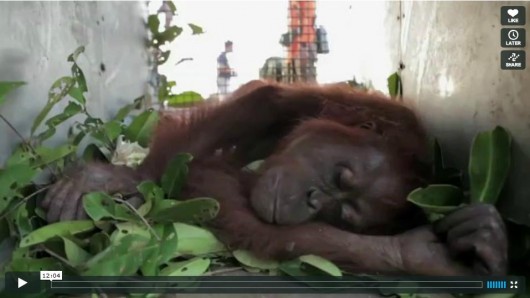 .
.
Notes:
.
1. The Environmental Investigation Agency (EIA) is a UK-based Non Governmental Organisation and charitable trust (registered charity number 1145359) that investigates and campaigns against a wide range of environmental crimes, including:
- illegal wildlife trade
- illegal logging
- hazardous waste
- trade in climate and ozone-altering chemicals.
.
2. RSPO Criterion 7.3 dictates that new plantings since November 2005 cannot replace any areas required to maintain or enhance one or more High Conservation Value. This includes “Forest areas containing globally, regionally or nationally significant concentrations of biodiversity values (e.g. endemism, endangered species).”
• To view the footage of the rescue go to ^https://vimeo.com/63254306
• For further photos of the rescued orangutans please contact Tom Johnson at tomaszjohnson@eia-international.org
• Interviews are available on request: please contact Karmele Llano Sanchez (IARI) at karmele@internationalanimalrescue.org or Tom Johnson (EIA) at tomaszjohnson@eia-international.org
• Caption for attached picture: An adult female orangutan who was rescued with her baby by IAR Indonesia in Ketapang, March 2013.
.
[Source: ‘Conservationists urge RSPO member to cease rainforest destruction after starving orangutans rescued from concession’, 20130404, Environmental Investigation Agency on behalf of International Animal Rescue, West Kalimantan (Borneo) Indonesia].
HSBC loans $135 million to Bumitama Gunajaya Agro (BGA) Group
.
<<DBS Indonesia and HSBC (Hongkong and Shanghai Banking Corporation) together with its syndication banks have completed the final process of Syndicated Term Loan Facility for Bumitama Gunajaya Agro (BGA) Group. Due to the oversubscribed participation, the final loan amount provided for the facility has been upsized to USD 135 million from the original amount of USD 110 million.>>
[Source: ^http://www.hsbc.co.id/1/2/misc/media-release/21-oct-10]
 Arnott’s Tim Tam, proudly killing Orangutans
(it is one of Australia’s largest selling products that includes Palm Oil in its manufacture)
Arnott’s Tim Tam, proudly killing Orangutans
(it is one of Australia’s largest selling products that includes Palm Oil in its manufacture)
.
<<Palm oil plantations are now the leading cause of rainforest destruction in Malaysia and Indonesia. In Southeast Asia alone the equivalent of 300 football fields are deforested every hour. At the current rate, experts believe Orang-utans will be extinct in the wild by 2013 (this year).
Palm oil and its derivatives are present in 50% of all packaged foods on our shelves. While 50% of products in Australian supermarkets contain Palm Oil, it is nearly impossible for consumers to be able to make an informed choice about which products to purchase. This is because under current food labelling laws, Palm Oil can be legally labelled as ‘Vegetable Oil’.
Australia’s current food regulations don’t require this truth in labelling.>>
.
[Source: ‘Food Labelling, ^http://www.nickxenophon.com.au/food-labelling].
.
Products blatantly continuing to include crude Palm Oil
.
Aldi Supermarkets
-Damora snack foods
-Belmont Biscuit co.
-GoldenVale cereals
-Dominion products
-Choceur chocolates
-Bramwells
-Sprinters chips
-Brookdale
-Milfina ice-cream
.
Arnott’s Biscuits
-Shapes (AP)
-Shapes Sensations (AP)
-Tim-Tams (AP)
-Wagon Wheels
-Mint Slice biscuit
-Royals
-Classic assorted
-Venetian
-Lemon Crisp
-Raspberry shortcake
-Arnott’s cookies
-Tiny Teddies
-Jatz Clix biscuits (savoury)
.
Coles Supermarkets (Coles brand range)
-“You’ll Love Coles” range (ice-cream, garlic bread, milk chocolate etc.)
-$mart Buy
-Coles Pastries: Donuts, Biscuits, Cakes, Muffins & Scrolls (AP)
.
Colgate-Palmolive
-Shampoos (AP)
-Conditioners (AP)
-Body wash (AP)
-Soaps (AP)
-Liquid hand-soap (AP)
-Shower gel (AP)
.
Colgate
-Toothpastes (AP)
-Mouthwash
-Shaving cream
.
Fonterra dairy products
-Dairy Milk
Anchor (Fonterra brand)
-Blue top milk
-Cheese singles
-Butter
Mainland cheeses (Fonterra brand)
-Edam cheese
-Colby cheese
-Tasty cheese
-Mild cheese
-Special reserve cheese range (AP)
.
Tip Top ice-creams (Fonterra brand)
-Joy Bar
-Soft serve
-Ice-creams in tub (AP)
-Ice-creams on cone (AP)
-Ice-creams on stick (AP)
.
General Mills
-Old El Paso tacos, dips, salsas & tortillas (AP)
-Betty Crocker products (AP)
-Cheerios breakfast cereal
-Nature Valley granola bars
-Fruit roll-ups
-Latina Pasta (AP)
.
Olay (owned by General Mills)
-Most cosmetics
.
Kraft
-Easy Mac
-Deluxe macaroni and cheese
-Peanut Butter
-Velveeta
-Cool Whip cream
.
.
Nabisco (owned by Kraft)
-Oreos (AP)
-Ritz Crackers
-Chips Ahoy! (biscuits)
-Wheat Thins
.
Heinz
.
-Beans
-Spaghetti
-Sauces & dressings
-Soups (AP)
-Frozen meals
-Desserts (AP)
-Wattie’s canned snack foods (AP)
-Weight watchers products
.
 .
.
Mars Incorporated
.
.
-M&Ms
-Snickers
-Mars Bars
-Milky Way
-Twix
-Bounty
-Maltesers
-Doublemint
-Dove
.
Wrigley’s (owned by Mars)
-5 gum (AP)
-Extra gum (AP)
-Juicy Fruit gum (AP)
-Starburst lollies
-Skittles lollies
-Hubba Bubba bubble gum (AP)
-P.K. chewing gum (AP)
.
Mars Petcare
-Pedigree
-My Dog
-Dine
-Kitekat
-Optimum
-Schmakos
-Advance
-Whiskas
-Royal Canin
.
Sara-Lee
-Bavarians
-Cakes & cheesecakes (AP)
-Chocolate Pies & Fruit Pies
-Croissants & Danishes (AP)
-Crumbles & Puddings
-Ice Creams (AP)
-Lasagna
-Quiches (AP)
.
Snack Brands Australia
-Cheezels
-Samboy chips (AP)
-CC’s corn chips
-Thins chips (AP)
-French Fries
-Chickadees
-Colvan chips
.
Uncle Tobys
.
-Fruit Breaks bars (AP)
-Chewy bars (AP)
-Bodywise bars
-Le Snak
-Roll Ups
.
‘AP’ = All products. Palm oil is found in all products or flavours of this specific brand. Example – palm oil is found in all flavours of Arnott’s Shapes: Plain, Chicken, Pizza, BBQ etc.
[Source: ^http://www.saynotopalmoil.com/].
“In 2008 Food Standards Australia and New Zealand (FSANZ) rejected an application for the compulsory labelling of Palm Oil, arguing that they have no legal capacity to hear the case.”
[Source: ^http://www.palmoilaction.org.au/shopping-guide.html].
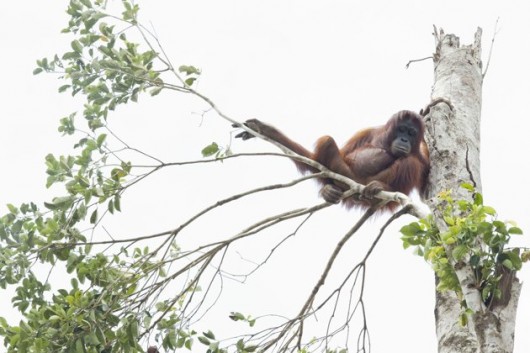 An adult orangutan looks down from its treetop home as the forest in Ketapang, Borneo, is bulldozed (Caters)
Source: ^http://uk.news.yahoo.com/orangutan-rescue-borneo–primates-deforestation-palm-oil-ketapang-mother-and-baby-104041487.html#tZX7oWc]
An adult orangutan looks down from its treetop home as the forest in Ketapang, Borneo, is bulldozed (Caters)
Source: ^http://uk.news.yahoo.com/orangutan-rescue-borneo–primates-deforestation-palm-oil-ketapang-mother-and-baby-104041487.html#tZX7oWc]
.
Food Standards Australia New Zealand Board
.
Under the FSANZ Act, the FSANZ Board is selected by the Australian Minister for Health and Ageing in consultation with the Legislative and Governance Forum on Food Regulation and must include qualified people from all walks of life.
.
[Source: ^http://www.foodstandards.gov.au/scienceandeducation/aboutfsanz/theboard/, April 2013].
 |
Ms Philippa Smith AM [s.116(1)(a)]Ms Philippa Smith, AM was appointed Chair of the FSANZ Board in July 2008. Ms Smith is a former Commonwealth Ombudsman, CEO of the Association of Superannuation Funds of Australia and the inaugural Chair of the Consumer’s Health Forum. She has developed strong strategic skills and extensive experience in ensuring effective accountability and governance structures across a number of portfolios. |
|
 |
Mr Steve McCutcheon (Chief Executive Officer) [s.116(1)(b)]Mr McCutcheon, who holds a Bachelor of Economics degree and has undertaken further studies in public law and public policy, was appointed CEO of FSANZ in October 2007. Before his appointment, Mr McCutcheon held a number of senior executive positions in the Commonwealth Department of Agriculture, Fisheries and Forestry. During that time, he led the team that developed the new food regulatory framework for Australia and New Zealand under the auspices of the Council of Australian Governments. Mr McCutcheon also led the Australian delegation to annual sessions of the Codex Alimentarius Commission. |
|
 |
Dr Michele Allan [s.116(1)(f)]Dr Michele Allan has strong leadership experience across many facets of the food industry. Her areas of expertise include manufacturing strategy, organisational strategy, risk and insurance leadership, food safety systems implementation, food packaging innovation and commercialisation. Dr Allan has held senior executive positions with Amcor Limited, Bonlac Foods, Bioinformatics Centre of Excellence Tasmania, Kraft Foods and ICI; and has also held board positions within both the private and public sectors. |
|
 |
Mr Peter Boyden [s.116(1)(g)]Mr Peter Boyden is an internationally experienced CEO with extensive general management and marketing experience gained in consumer foods businesses in Australia, the United Kingdom, the Netherlands and Greece. Mr Boyden has been the Managing Director and regional Board member of the Unilever Australasian foods business and a Board member of the Australian Food and Grocery Council. His areas of responsibility have included the management of consumer marketing, product and packaging development, food production and general management, where he has focused on strategy development and portfolio management. |
|
 |
Professor Stephen Corbett [s.116(1)(f)]Professor Stephen Corbett has had more than 20 years of experience as a public and environmental health physician, with qualifications in public health and medicine. His interests include environmental health risk assessment and management, regulatory policy and practice, and chronic disease prevention. Professor Corbett’s experience includes holding senior executive positions in NSW Health-Public Health; being Conjoint Associate Professor at the School of Public Health, University of Sydney and Western Clinical School, Westmead Hospital; and being Associate Editor on the journal Evolution, Medicine and Public Health. |
|
 |
Ms Jenni Mack [s.116(1)(d)]Ms Jenni Mack has worked in consumer affairs since 1993 when she was Executive Director of the Australian Federation of Consumer Organisations. Her work has spanned food, chemicals, telecommunications, energy and financial services policy incorporating areas such as industry self-regulatory and co-regulatory practices, professional standards and codes of practice. Ms Mack has worked closely with regulators and government agencies on good regulatory science, community education, licensing, best practice enforcement and compliance schemes, and community and social research projects. |
|
 |
Dr Andrew McKenzie QSO [s.116(1)(c)]Dr Andrew McKenzie is qualified as a veterinarian with post graduate qualifications in veterinary public health and has a background working for the New Zealand Ministry of Agriculture and Fisheries with a focus on the meat, seafood and other food industries. In 2002, Dr McKenzie set up the New Zealand Food Safety Authority and led it until his retirement in June 2010. He has extensive experience in domestic food safety policy and standards, as well as international food safety and trade standards at the bilateral and multilateral level. Dr McKenzie has a continuing interest in management and governance, as well as contemporary regulatory approaches to food safety/quality and trade, particularly around standard-setting. |
|
 |
Dr James (Gardner) Murray AO PSM [s.116(1)(f)]Gardner Murray has veterinary medicine, surgery and management qualifications. Through his work in high level government positions and via his company—Gardner Murray Pty Ltd., Dr Murray has contributed to national and international developments in food safety, animal health, ‘One Health’ (collaboration between animal, human and environmental scientists and related disciplines to achieve optimal health), biosecurity, market access, emergency management, animal welfare, policy development and strategic planning. He has held and holds numerous high level Board, Commission and Committee positions at the national and international levels. |
|
|
|
Mr Tony Nowell CNZM [s.116(1A)]Mr Tony Nowell has had extensive senior executive experience across various industries (including food) both internationally and within New Zealand. This has included holding positions such as CEO of Zespri International; Managing Director of Griffin’s Foods; Regional Vice President of Sara Lee Asia; Zone Manager for Sara Lee Indonesia, Philippines and Thailand; Managing Director of Sara Lee Indonesia; Managing Director of L’Oreal Indonesia; and Operations Manager of L’Oreal New Zealand. Mr Nowell’s other roles and responsibilities have included being the former Chair of the New Zealand Packaging Accord Governing Board and the New Zealand Government Food and Beverage Taskforce; and include Chairmanship of the New Zealand Forest Research Institute and Wellington Drive Technologies, as well as directorships at New Zealand Food Innovation Auckland and the Export Advisory Board of Business New Zealand. Mr Nowell has represented New Zealand as a member of the APEC Business Advisory Council since 2007. |
|
 |
Dr David Roberts [s.116(1)(g)]Dr David Roberts is a food and nutrition Consultant with extensive experience in health and science. He has expertise in public health, food science, food allergy, human nutrition, food safety, food industry, food processing/retail, government and regulation. Dr Roberts was the Deputy CEO and scientific and technical Director of the Australian Food and Grocery Council for 5 years until October 2007. Prior to that, he had held the Foundation Chair in Nutrition and Dietetics (established 1991) at the University of Newcastle for 10 years. Dr Roberts was at Sydney University for 12 years teaching and researching in nutritional biochemistry. He is a former Chair of the Federation of Australasian Nutrition Organisations, former President of the Nutrition Society of Australia (3 years), former Chair of the NSW Branch of AIFST (1 year), former Chair of the inaugural Complementary Medicines Evaluation Committee of the Therapeutic Goods Administration (4 years) and former member of the editorial board of the British nutrition foundation (10 years+). |
|
 |
Mr Neil Walker JP [s.116(1)(ca)]Mr Neil Walker is a food scientist with 35 years of experience in the dairy industry in New Zealand. He is a fellow of both the Institute of Chemistry and the New Zealand Institute of Food Science and Technology (NZIFST); and was the Dairy Chair of the NZIFST. He has had experience as Chair, director, trustee and committee member in relation to public councils and authorities; private trusts; companies and organisations; and national, community, charitable and family entities. |



